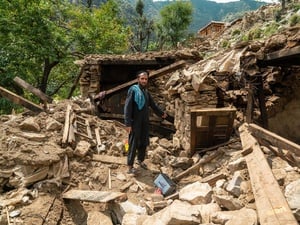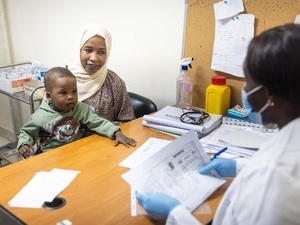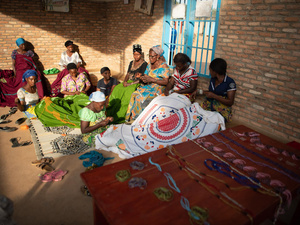Growing number of Burundians flee to neighbouring Tanzania
Growing number of Burundians flee to neighbouring Tanzania

A Burundian child at one of Tanzania's way stations, where thousands of Burundian asylum seekers are currently living despite the lack of infrastructure.
GENEVA, Feb. 14 (UNHCR) - A growing number of Burundians have been crossing the border to take refuge in neighbouring Tanzania in the past few weeks. UNHCR is very concerned about their living conditions in the overcrowded Tanzanian way stations where they arrive and stay, sometimes for weeks or even months.
There are now more than 4,000 Burundian asylum seekers in three way stations in the district of Kibondo, in north-western Tanzania. Some 3,500 Burundians have crossed the border since the start of the year and the numbers keep growing at an average rate of 100 new arrivals a day. On Monday alone, more than 500 newcomers were registered in way stations along the border, most of them at Nyakimonomono, where more than 2,500 people now live in very poor conditions.
"The living conditions in Nyakimonomono and other way stations are not good," UNHCR spokeswoman Jennifer Pagonis told reporters in Geneva on Tuesday. "Way stations are designed to receive people who have just crossed the border for a very short period of time only - no more than a few days in most cases."
UNHCR and its partners have done their best to improve conditions in the way stations - water supplies have been improved, the ground drained around shower and water supply areas, new garbage pits dug and additional shelters, kitchens and latrines built. Nevertheless, the health hazards of having so many people staying in places meant to accommodate only a few remain very high, and staff on the ground describe the situation as critical. Concern is especially high for those who arrive in a vulnerable state - small children, the elderly and the sick, pregnant women.
"There are visible cases of malnutrition among the new arrivals," Pagonis said. "A toddler died last week on arrival suffering from dehydration, and three young children died in January from acute respiratory infection."
UNHCR is negotiating with the Tanzanian authorities in order to be able to move those people who are granted asylum away from the border into already established camps. So far, however, only a small number of people have been granted asylum - 57 of them were moved to Mkugwa refugee camp last Friday and another group of some 100 people is to be moved this week.
The majority of the new arrivals come from Burundi's eastern province of Ruyigi. Lack of food and growing insecurity are the two main reasons they put forward for leaving their country. Worryingly, a significant number of people among the newcomers had recently repatriated to Burundi. They are now coming back to Tanzania, a country where many of them had previously spent many years in refugee camps.
Hundreds of thousands of Burundians fled their country during the long years of fighting and civil unrest that devastated the central African nation. The vast majority sought refuge in neighbouring Tanzania. In 2002, following the peace accord that brought the violence to an end, UNHCR started a voluntary repatriation operation for Burundian refugees. Since then, more than 290,000 Burundian refugees have returned home. However, the number of those choosing to repatriate has plummeted in recent months to around 1,000 people a month, compared with some 10,000 in previous months and years.
UNHCR is assisting some 350,000 refugees in Tanzania, 195,000 of them from Burundi, the rest mainly from the Democratic Republic of the Congo. Since October of last year, UNHCR has also been helping to repatriate Congolese refugees who wish to return home.









